UK Summons Iran’s Envoy Over ‘Abhorrent’ Hanging Of Protester
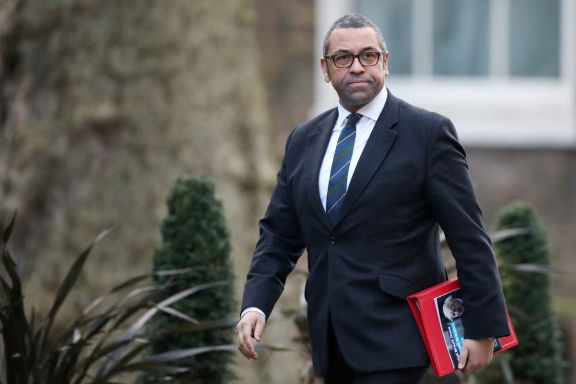
Britain on Friday summoned Iran's most senior diplomat in London to protest the hanging of Mohsen Shekari, the first such execution over ongoing antigovernment unrest.

Britain on Friday summoned Iran's most senior diplomat in London to protest the hanging of Mohsen Shekari, the first such execution over ongoing antigovernment unrest.
"The execution of Mohsen Shekari by the Iranian regime is abhorrent. He is a tragic victim of a legal system in which disproportionate sentences, politically motivated trials and forced confessions are rife," Foreign Secretary James Cleverly said in a statement.
"We have made our views clear to the Iranian authorities – Iran must immediately halt executions and end the violence against its own people," Cleverly added.
On Thursday, Germany also summoned Iran’s ambassador over the execution, with Foreign Minister Annalena Baerbock describing the Iranian regime's contempt for humanity as “boundless."
Earlier on Thursday, the Islamic Republic hanged Mohsen Shekari, a young protester sentenced to death in a sham trial for injuring a regime supporter and closing off a street in the capital Tehran. The revolutionary court had accused him of Moharebeh, an Islamic-Arabic term meaning ‘fighting against God” which carries the death sentence.
The execution, widely seen as a measure to intimidate the protesters, has drawn international condemnation with EU countries vowing further coordinated action against the clerical regime.
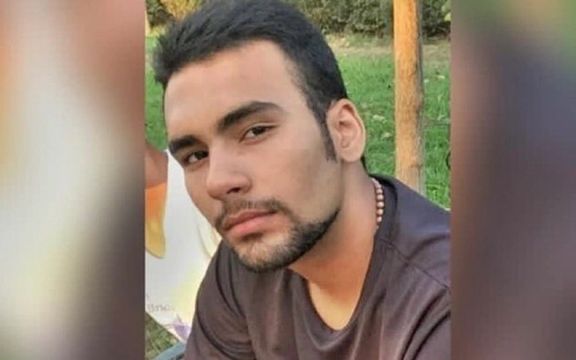
Rejecting international reactions over the execution of a protester for injuring a Basij paramilitary agent, the Islamic Republic defends it as a standard procedure.
In a short statement on its Twitter account, the regime’s Ministry of Foreign Affairs claimed that the government has "exercised the utmost restraint in dealing with the riots".
“In countering riots, the Islamic Republic has shown utmost restraint and -- unlike many Western regimes who smear and violently crack down even on peaceful protesters -- Iran has employed proportionate and standard anti-riot methods. The same is true for the judicial process: restraint and proportionality,” the statement read.
The ministry then repeated the official rhetoric, blaming other countries for the protests, saying that “Yet, public security is a redline. Armed assault and vandalism aren't tolerable, even to Western regimes... Instead of exposing its mendacity by politicized statements, the West must stop hosting, backing and encouraging terrorists.”
In his first speech after the execution of the first protester, Mohsen Shekari, President Ebrahim Raisi announced that "the trial and punishment of the protesters" will continue. Also, Ahmad Khatami, a hardliner cleric and Friday prayer Imam expressed his gratitude “for the decisiveness of the judiciary, which sent the first rioter to the gallows.”

Judiciary spokesman Masoud Setayeshi had announced Tuesday that five more people indicted in the killing of a Basij militia member, Rouhollah Ajamian, were sentenced to death.
Shekari’s hanging after a hasty and unfair trial has sparked deep anger among Iranians, who believe his killing was meant to instill fear among the people, and world leaders who describe the act as the acme of atrocity and a nadir of humanity.
People across Iran, especially the capital Tehran and Zahedan, the provincial capital of Sistan-Baluchestan province, held rallies in protest to Shekari’s execution and many others who are in danger of imminent execution.
The UN Human Rights council also deplored the hanging of Shekari and expressed concerns for at least 11 other protesters sentenced to death. “We call for an immediate halt to executions. Death penalty is incompatible with human rights and cannot be reconciled with right to life," the body said.
The global outcry over the executions is not limited to politicians and state officials as many celebrities and right activists have also denounced the act with grassroot activists, known as the youth of Tehran's neighborhoods calling for a demonstration on Saturday afternoon.
Canada-based activist Hamed Esmaeilion, whose daughter and wife were killed by the IRGC, have also called for rallies in many cities of the world on Saturday and Sunday in protest to Shekari’s execution and all the others planned to take place in the coming days.
British entrepreneur and business magnate Richard Branson called the execution “unacceptable and cruel.” saying “Iran’s brutal and corrupt regime must be held accountable by the international community.”
British author and philanthropist J. K. Rowling said in a tweet on Friday that “Mohsen Shekari was murdered by the state for wanting freedoms so many of us take for granted.”
Following his death, Shekari came to be known among the Iranian social media users as an avid gamer, which drew a lot of reaction from the gaming community. David Jaffe, a video game designer best known for creating the God of War series, called his execution “Sad, pathetic, and heart breaking.” “ANYONE who stands up against the sort of 'leadership' they have in Iran is a hero in my book. Rest in Peace and Power, Mohsen Shekari. Hoping your bravery, strength, and activism serve as an inspiration for millions,” he tweeted.
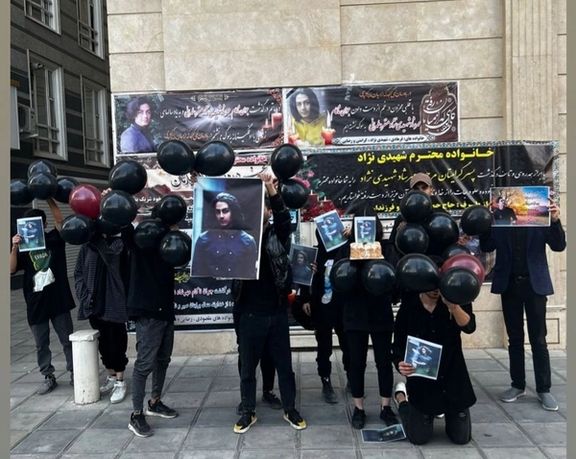
Britain announced sanctions Friday against 30 people worldwide, including Iranian officials, for serious rights violations, such as the violence on protesters.
The move came a day after France announced plans for new European Union sanctions against Iran over human rights abuses in its security crackdown on popular unrest there as well as its supply of drones to Russia before Moscow's invasion of Ukraine. The proposed sanctions will be taken up by the EU early next week.
Iran executed the first detained protester December 8 after a sham trial, sparking worldwide outrage and condemnations. The execution is seen as part of a government strategy to intimidate ordinary people and activists from pursuing the almost three-month-old antigovernment protests movement.
Canada also announced fresh sanctions against Iranian officials December 9, in what appears to be coordinated actions by Western governments.
The British government said its sanctions were coordinated with international partners to mark International Anti-Corruption Day and Global Human Rights Day. They encompassed individuals involved in activities including the torture of prisoners and the mobilization of troops to rape civilians.
"Today our sanctions go further to expose those behind the heinous violations of our most fundamental rights," Foreign Secretary James Cleverly said in a statement.
Britain sanctioned 10 Iranian officials connected to Iran's prison systems. This included six people linked to the Revolutionary Courts that have been responsible for prosecuting protesters with sentences including the death penalty.
Nationwide protests that erupted after the death in police custody of 22-year-old Kurdish Iranian woman Mahsa Amini on September 16 have posed one of the biggest challenges to the Islamic Republic since its establishment in 1979.
The British government sanctioned Ali Cheharmahali and Gholamreza Ziyayi, former directors of Evin prison in Tehran, which it said was a facility notorious for the mistreatment of both Iranian and foreign detainees. Evin houses many political prisoners, where torture and forces confessions are conducted.
The foreign office said the sanctions against 11 countries across seven sanctions regimes were the most that Britain has ever imposed in one package.
Britain also sanctioned figures involved in Myanmar's military, which it said were involved in committing massacres, torture and rape.
Among those sanctioned by Britain were Myanmar's Office of the Chief of Military and Security Affairs, which it said had been involved in torture since last year's military coup, including rape and sexual violence.
Those sanctioned also include Russian Colonel Ramil Rakhmatulovich Ibatullin for his role as the commander of the 90th Tank Division, which has been involved in fighting since Russia's invasion of Ukraine earlier this year.
The government said there have been multiple allegations made against serving members of the 90th Tank Division, including the conviction in Ukraine of a senior lieutenant on sexual abuse charges during the conflict.
Russia, which has said it is conducting a "special military operation" in Ukraine to eliminate threats to its security, has denied committing war crimes or targeting civilians.
But extensive evidence has existed since the beginning of the conflict attesting to large-scale human rights violations that some believe constitute war crimes.
With reporting by Reuters
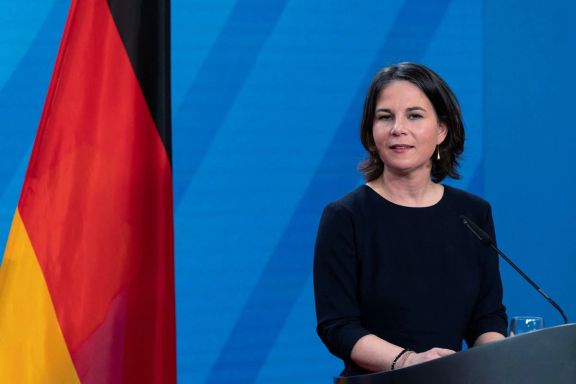
Germany summoned Iran’s ambassador Thursday after the Islamic Republic executed the first Iranian arrested during the current wave of antigovernment protests.
A diplomatic source broke the news but did not provide any details about what transpired. Earlier on Thursday, the Islamic Republic hanged Mohsen Shekari, a young protester sentenced to death in a sham trial for injuring a regime supporter and closing off a street in the capital Tehran. The revolutionary court had accused him of Moharebeh, an Islamic-Arabic term meaning ‘fighting against God” which carries the death sentence.
The execution, widely seen as a measure to intimidate the protesters, has drawn international condemnation with EU countries vowing further coordinated action against the clerical regime.
German Foreign Minister Annalena Baerbock described the Iranian regime's contempt for humanity as “boundless," saying that Shekari was “tried and executed in a perfidious summary trial because he disagreed with the regime. But the threat of execution will not stifle people's desire for freedom.”
Moreover, Vice-President of the German Parliament Katrin Göring-Eckardt tweeted that the execution “reacts with all (un)imaginable brutality to protests."
Since the beginning of the unrest, Berlin has summoned Tehran’s ambassador several times over the heavy-handed crackdown on the popular protests.
So far, around 500 civilians have been killed by security forces and at least 18,000 arrested. While many have been released, around 1,500 face criminal charges, and at least 80 detainees face the death sentence.

The prospect of long-term protests are beginning to emerge in the Iranian media, with some arguing that there is no bright prospect for an end to the crisis.
Protesters’ demands have gone beyond partial reforms, and they just want an end to the Islamic Republic’s clerical, authoritarian rule. There are no constitutional or institutional mechanisms to resolve the conflict.
The first execution of a protester on Thursday also signalled that the regime is not looking for any compromise and has decided to amplify violence to subdue the people.
Meanwhile, political scientist Ahmad Banijamali told Khabar Online that "Institutionalized denial of the problem is the most important obstacle for ending the ongoing crisis in the Iranian society."
He said, "the protests have led to an impasse and there is no bright prospect for the future. In the absence of civil institutions such as trade unions and political parties, strategic mistakes in the analysis of the situation by the people and the government can lend a new momentum to the crisis." He also pointed out that it is dangerous that elements who are not part of the political structure can determine the direction of events.
Banijamali added: "Political systems need to have very important tools that can take them out of a crisis: Institutions to end disputes and begin a move toward a compromise, such as powerful social institutions such as political parties, trade unions, guilds, and civil institutions."
He stressed that the Islamic Republic has eliminated all these mediation mechanisms and as a result, the government faces a shapeless mass that lacks any institution. So, even if it is really interested to negotiate, it does not know who it needs to turn to for facilitating the process."
Banijamali further explained that the powerhouse of the Islamic Republic has traditionally been a chaotic system marked by anarchy. “This is a non-functional system in which status groups, pressure groups and wealthy entities hold a piece of the cake. At the same time, creation of unnecessary institutions has increased the system's inefficiency." He added that conflict of interests between different parts of the system has made decision-making impossible, particularly over significant matters."
Banijamali added that "in this situation, it is not clear who is going to put an end to the dispute as the opposition has always been in an antagonistic conflict with the system, political forces such as reformists and moderates have been discredited by radicals in the system and the society no longer accepts them as its own voice. It is a scary situation in which the institutions that should have been at the top and bottom of the society are absent and radical elements are there to lend momentum to the crises."
This week news emerged that the Fajr Film Festival which is usually held to mark the anniversary of the 1979 Islamic Revolution in mid-February, might not take place, signaling that the ongoing uprising is not likely to end in the next three months.
Reza Dorostkar, the deputy director of the Iranian Film Critics Association said in an interview that "Under the current circumstances, the Fajr Film Festival should not be held this year."
Like some other Iranian film industry figures, film critics have said in a statement that in view of "bitter and unpleasant events of recent months," they prefer not to take part in this year's festival while suggesting that the festival should not be held at all this February.
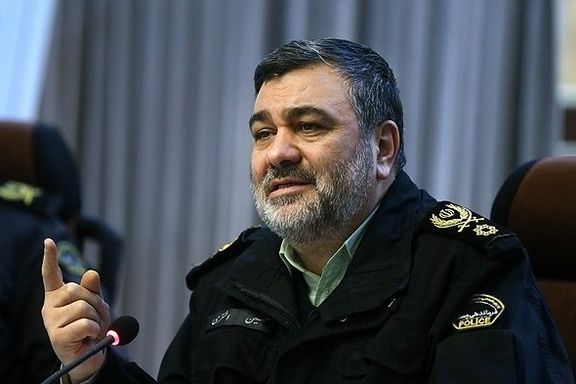
Despite the regime killing about 500 protesters and hanging one, Iran’s police chief threatened the people with more "decisive" response in the coming days.
Commander-in-chief of Law Enforcement Force of Islamic Republic Hossein Ashtari claimed Thursday that the police have shown "restraint" towards the protesters and will deal with them "decisively" from now on.
Describing the protesters as "seditionists," he said that "for more than 70 days, the police have been a powerful presence” against the protesters.
The Islamic Republic authorities have kept threatening protesters with more violent confrontation with little effect on the determination of protesters, with fresh nationwide protests on Wednesday and three days of strikes.
On Thursday, people held gatherings to mourn the 40th day after the death of the death of several protesters in different parts of the country. Holding mourning ceremonies on specific days after someone’s death has traditional cultural significance, therefore the more the regime kills people to muffle the protests, people tend to take to streets more for mourning ceremonies and the vicious circle continue.
People in several neighborhoods of the capital Tehran held protest rallies Thursday night after the first execution of a protester. People held rallies chanting slogans vowing to avenge Mohsen Shekari’s “legal killing”, as many Iranians said on social media.
Shekari’s hanging after a hasty and unfair trial has sparked deep anger among Iranians, who believe his killing was meant to instill fear among the people, and world leaders who describe the act as the acme of atrocity and a nadir of humanity.
Announcing a new package of punitive measures against the regime, European countries urged the Iranian officials to refrain from applying the death penalty and carrying out any future executions, and to pursue a consistent policy towards the abolition of the death penalty altogether. “We call on the Iranian authorities to refrain from the unacceptable practice of using forced and publicized confessions as a basis for ascertaining the facts of alleged crimes. It is imperative for the Iranian authorities to uphold the accused individuals’ due process rights and ensure that those who are under any form of detention or imprisonment are not subject to any form of mistreatment,” the European Union said in a statement.
White House National Security Advisor Jake Sullivan echoed remarks by many other politicians, saying, “The unjust and cruel execution of Mohsen Shekari is a cynical attempt to intimidate the brave Iranian people... We will hold the Iranian regime accountable for the brutal violence it’s committing against its own people.”
Nationwide protests that erupted after the death of 22-year-old Kurdish Iranian woman Mahsa Amini on September 16 represent one of the biggest challenges to the Islamic Republic since its establishment in 1979. So far, around 500 civilians – including over 60 children -- have been killed by security forces and at least 18,000 arrested. While many have been released, around 1,500 face criminal charges, and at least 80 detainees face the death sentence.